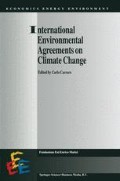Abstract
Recently, policy analysis has begun to focus on CO2 concentration limits as possible objectives of policy toward climate change. Wigley et al (1996), for example, consider alternative emissions paths designed to achieve one of several possible concentration targets in a given time frame. They argue that some emission paths will have much higher economic costs of achieving a given target, while producing only slightly lower global mean temperature and sea level rises during the period of transition to the ultimate concentration target.
Access this chapter
Tax calculation will be finalised at checkout
Purchases are for personal use only
Preview
Unable to display preview. Download preview PDF.
References
Chao, H.-P. and Peck, S. (1997) Optimal environmental control and distribution of cost burden for global climate change. Journal of International and Comparative Economics, in press.
Chilchilnisky, G. and Heal, G. (1994) Who should abate carbon emission? An international viewpoint. Economics Letters, 44, 443–449.
Energy Modeling Forum (1995) Second Round Study Design for EMF14: Integrated Assessment of Climate Change. Draft. Stanford, CA: Stanford University Energy Modeling Forum.
Fankhauser, S. (1995) Valuing Climate Change: The Economics of the Greenhouse. London: Earthscan.
Intergovernmental Panel on Climate Change (1990) Climate Change: The IPCC Scientific Assessment. Cambridge: Cambridge University Press.
Manne, A.S. and Richels, R.G. (1992) Buying Greenhouse Insurance: The Economic Costs of CO2 Emission Limits Cambridge, MA: MIT Press.
Manne, A.S. and Richels, R.G. (1997) On Stabilizing CO2 Concentrations — Cost-Effective Emission Reduction Strategies. Draft. Palo Alto, CA: Electric Power Research Institute.
Negishi, T. (1972) General Equilibrium Theory and International Trade. Amsterdam North-Holland. Nordhaus, W.D. (1991) To slow or not to slow: the economics of the greenhouse effect. Economic Journal, 101, 920–937.
Peck, S.C. and Teisberg, T.J. (1992) CETA: a model for carbon emissions trajectory assessment. Energy Journal, 13, 1, 55–77.
Peck, S.C. and Teisberg, T.J. (1997) International CO2 emissions targets and timetables: an analysis of the AOSIS proposal. Environmental Modeling and Assessment, 1, 4, 219–227.
Wigley, T.M.L., Richels, R. and Edmunds, J.A. (1996) Economic and environmental choices in the stabilization of atmospheric CO2 concentrations. Nature, 379, 18, 240–243.
Author information
Authors and Affiliations
Editor information
Editors and Affiliations
Rights and permissions
Copyright information
© 1999 Springer Science+Business Media Dordrecht
About this chapter
Cite this chapter
Peck, S.C., Teisberg, T.J. (1999). Co2 concentration limits, the costs and benefits of control, and the potential for international agreement. In: Carraro, C. (eds) International Environmental Agreements on Climate Change. Fondazione Eni Enrico Mattei (Feem) Series on Economics, Energy and Environment, vol 13. Springer, Dordrecht. https://doi.org/10.1007/978-94-015-9169-0_4
Download citation
DOI: https://doi.org/10.1007/978-94-015-9169-0_4
Publisher Name: Springer, Dordrecht
Print ISBN: 978-90-481-5155-4
Online ISBN: 978-94-015-9169-0
eBook Packages: Springer Book Archive

